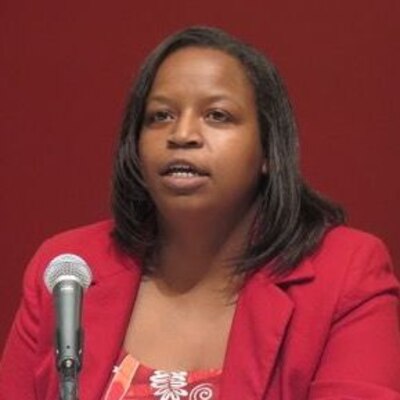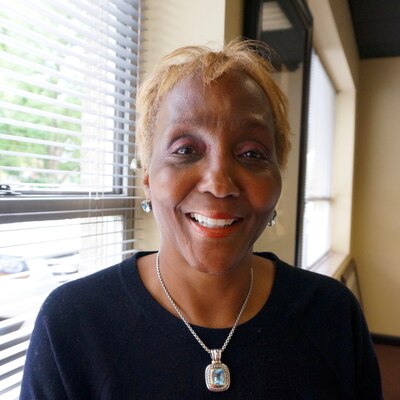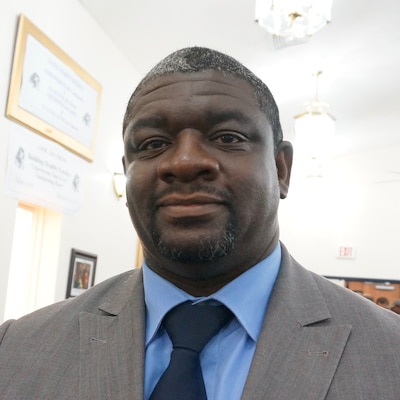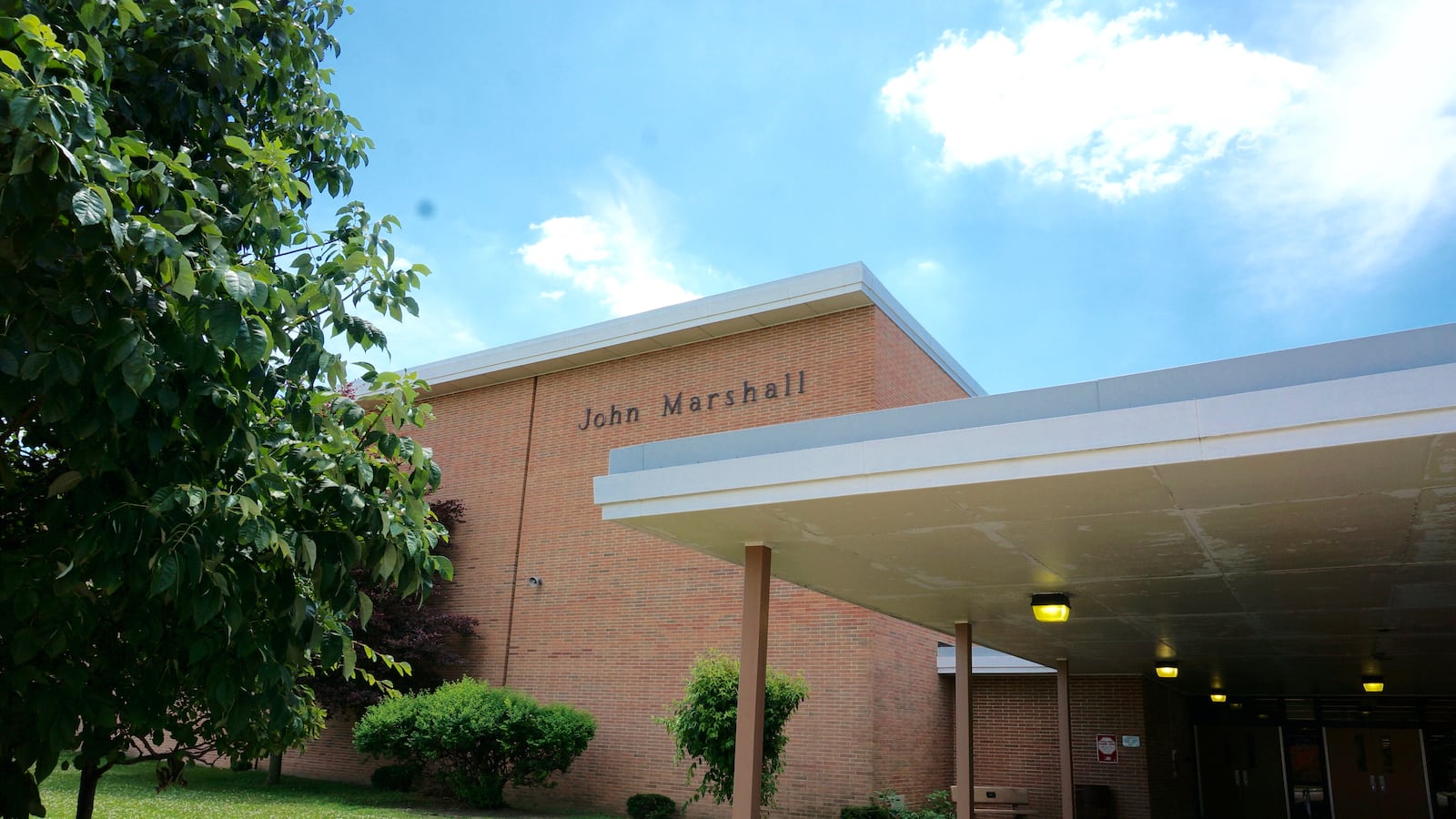This is the second in a series of stories profiling the 10 candidates for Indianapolis Public Schools Board and their positions on some of the most substantive issues facing the district. In the coming weeks Chalkbeat will profile the candidates for each of the seats up for election. Today we cover District Two, where Nanci Lacy, Venita Moore and Ramon Batts are facing off for a seat representing a corridor on the northeast side of the district, which includes Arlington and John Marshall High Schools.
For more coverage of the campaign for school board and the state political candidates check out the Chalkbeat election series.
Dissent is scarce on the Indianapolis Public Schools Board, and it could become even more unusual after this election.
Gayle Cosby, who is often the lone voice of discord, is not running for a seat on the board. But it’s unclear whether the role of skeptic will be filled by her successor. Two of the candidates vying for Cosby’s seat have been vocal in their criticism of the administration. The third, Venita Moore, has also expressed some concern with the district’s relationship with the community, but she is more muted in her criticism and she won an endorsement from the pro-reform parent organizing group Stand for Children.

Nanci Lacy comes to the school board race through her work as an IPS parent. Lacy initially become involved with the district as the parent of an autistic child, and she has continued her advocacy as a founder of Education Community Action Team, which pushes for greater community voice in schools and helps parents navigate the school system.
Lacy, who graduated from Perry Meridian High School, has three children who attended IPS schools, including her youngest son who is currently enrolled in Arlington High School. A single mother who works in customer service for a staffing agency and runs her own property management business, Lacy said that one reason she is running for the board is because she wants to be a voice for low-income parents like her who often feel disempowered by the school system.
“I represent that demographic of parents that they say is not involved in education, that doesn’t understand the issues enough to get involved,” she said. “I’m running to say, ‘that’s not true.’ ”
Lacy is sharply critical of the role outside organizations such as the Mind Trust, a nonprofit that supports partnerships between IPS and charter schools, have played in reshaping the district.
“The feeling is that if it doesn’t come out of the Mind Trust, it doesn’t matter, and no one entity should have that much power over the way things are run,” she said.

Venita Moore, a business consultant who once led a state agency, has a long history with the district. As a teenager, she was bused to Arlington High School as part of a district integration program and her daughter graduated from Crispus Attucks High School.
“I am really running for my daughter, my daughter’s daughter,” she said. “I think public schools are necessary. And I think public schools have to be as good as or better than many of the other schools. Our children come from so many diverse areas, and they need the support to be able to move forward.”
Moore, who is a partner in an Indianapolis-based consulting firm, says her public and private sector management experience makes her a strong fit for the board. She once served as the interim secretary of the Indiana Family and Social Services Administration, which oversees a wide range of state services, including Medicaid, early childhood education and disability programs.
“I will bring a different perspective to the board,” she said. “I am able to work with people whether or not they agree with me.”

Ramon Batts is the only candidate for the board who is also a teacher. A former-IPS teacher, Batts now runs an alternative program at Emma Donnan Middle School.
Batts is a graduate of Arsenal Technical High School, the same school his mother, father and uncles attended. His son is currently a senior in the math and science magnet program at the school, and he has three children in college. Batts, who ran for school board in 2010, 2012 and 2014, argues that his experience as an educator makes him the most qualified candidate for the board.
Batts believes that the current IPS board does not do enough to hold Superintendent Lewis Ferebee accountable and does not seek enough input from families and community members before making decisions.
“We have a parent engagement problem,” he said. “This lack of transparency that we have with decisions that are being made — the parents and community aren’t aware and they have very little input.”
On innovation schools:
Lacy is skeptical of the move to create innovation schools, which are considered part of IPS but are managed by outside partners. She does not believe there is enough evidence to show the innovation managers chosen can do a better job than IPS administrators, she said.
“I am for the improvement of student outcomes, but you’ve got to prove it to me,” she said. “Until there is more data, and the board forces them to produce more data, I cannot support more innovation schools.”
Moore said it’s too early to say whether the district should extend innovation school contracts or create new innovation schools because the district doesn’t yet know whether the schools will be successful.
“If they are proven to be successful, then I think we should continue through the process. If they are not, then I think we should stop,” she said. “Do I think we should expand? It depends on the expansion … and the type of instructional models they are considering, whether or not those are things that our children need.”
Batts said he doesn’t know enough about whether innovation schools are academically successful to have a clear opinion on the approach. He is concerned about transparency when the district creates innovation schools, he said, but if families and community members are engaged with the process and support innovation schools, he would support them.
“As long as people are informed and they understand … then it’s the community’s will,” he said.
On Superintendent Ferebee:
Lacy raised several concerns about Ferebee. She said that when the board chose a superintendent, it should have selected a local candidate with closer ties to Indianapolis — rather than an out-of-towner making a stop on his career path. She also said she didn’t like how Ferebee handled a scandal involving failure to immediately report a counselor accused of abuse to the state.
“After hearing how much (Ferebee) knew about the sex abuse scandal … and how long it took to report, I honestly felt like everyone involved in that should’ve been gone,” Lacy said. “For that alone, he should be gone, and we should be looking for another superintendent, someone who will not try to cover up and will actually protect our kids.”
Moore said that Ferebee needs to improve his communication and connection with the community. She said the board should work with Ferebee, and judge him based on whether he meets goals set by the new board. But she also praised Ferebee as someone who is open to new ideas.
“I think he has great ideas,” she said. “I think his ability to connect with our community has been some of his drawbacks. I think that he should in the beginning of the process be a little bit more open to sharing information and asking for input.”
Batts said that Ferebee should improve district transparency and his connections with the community.
“I’m not sure he has the community connection that he needs to have,” he said. “There is room for improvement, especially in the area of transparency.”
On closing schools with low enrollment:
Lacy said the district should not close high schools because that would suggest that elementary and middle school students in the district won’t attend IPS high schools. She pointed to Arsenal Technical High School, which has many career and technical education programs, as an example of a high school model that would attract more families to the district.
“We are in a competition for students with these charter schools,” she said. “There are opportunities to expand the programing in high schools that will attract more people.”
Moore said that if the district doesn’t have enough students to maintain schools, it should look at closings among other options. If the district does have to close schools, it should make sure the buildings are taken over by community groups or businesses to prevent leaving a “void” in the community, she said. She also argued the district could attract more students to its high schools.
“If we get good instructional models, people will want to come to our district,” she said.
Batts said he opposes closing high schools, arguing that the district should instead work to attract more students. Elementary schools currently have enough students to fill the high schools the district has, he said.
“Those schools are special to a lot of people,” he said. “Those schools have alumni who want to be involved, who want to be contacted … and who want to help to keep the doors open.”
On supporting teachers:
Lacy said the district should do more to train teachers in the new discipline guidelines, which aim to reduce suspensions and expulsions. She thinks the the new guidelines are too lax, allowing seriously misbehaving students to avoid appropriate consequences for their actions.
She also suggested that the district should raise teacher pay and seek more input from teachers about what they need in their classrooms.
“We need to create an environment where teachers feel like they can say, ‘this is not right. I don’t feel like this is going right. I don’t like this policy,’ “ she said.
Moore said that when she was a child, her fellow students often said they wanted to be teachers when they grew up, but now society places less value in educators. Teachers should be treated with more respect, she said.
“We should be open to really listening to our teachers, seeing what they suggest could improve our district,” she said.
Moore also said the district budget constrains teacher pay, but they should be paid competitively based on performance.
Batts said the district needs a plan for teachers to receive bonuses that are not tied to test scores and regular raises. He said that teachers need more freedom in the classroom and less pressure to teach to tests.
“Our teachers need an opportunity to teach and be creative again, so that they can teach our children to dream — they can teach our children to be creative,” he said.

